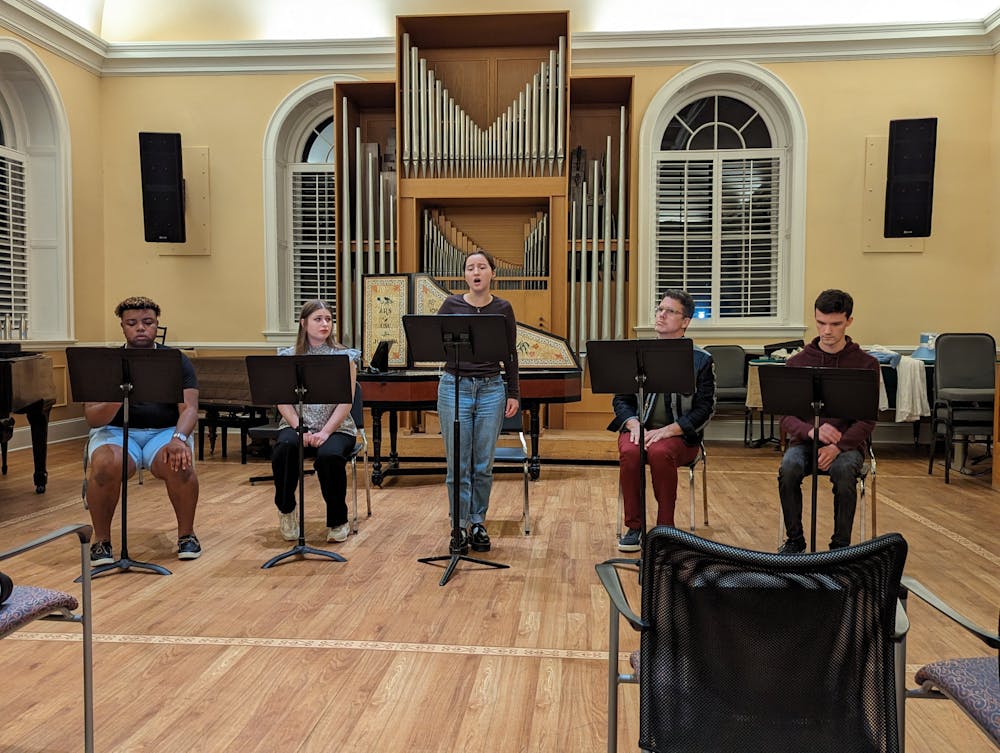Sweet's book follows Lanah Sawyer, a seventeen-year-old seamstress in 18th-century America. In 1793, Sawyer was sexually assaulted by Henry Bedlow.
Bedlow was charged with rape, and the proceeding case became the first published report of a rape trial in America.
After reading the book last fall, Raybon reached out to Sweet about adapting his retelling of Sawyer's story to a musical form.
Sweet said that while he was initially unsure about what the performance would look like, he enjoyed watching the planning process and involvement of people from different disciplines.
“I think what a musical performance can do is flesh out, in more imaginative ways, in different artistic directions, some of the emotional life of the characters where I was a little bit constrained in the book because I’m working with historical evidence, which is quite limited,” Sweet said.
The emotional aspect of the performance was evident in its first of four sets titled “Violation.” Through contemporary choral music that integrated quotes from the original trial, Raybon and four other singers recounted the night of the assault.
The four singers were UNC undergraduate music students Eden Rosenbaum, Isabelle Kosempa, Cameron Davis and Ethan Bunch, who worked with Raybon over Zoom to prepare for the performance.
During this set, the singers dressed the mannequin at the front of the room, which represented Lanah Sawyer, in a thin gown.
This gown, alongside the other period pieces to be displayed, was hand stitched by E. Katherine Hargrove, an apprentice milliner and mantua-maker at Colonial Williamsburg, and their colleagues.
After hearing about the project, Hargrove said she immediately wanted to be involved and utilized diaries, letters and fashion plates from the 18th century to gain a better understanding of what Sawyer might have worn.
“Hopefully, in making the clothes and having that physical representation of Lanah as an individual, I’m hopeful that at least one person looked at it and got an idea of ‘Oh, I’ve made the connection now because there’s that physical presence,’” they said.
The second and third sets of the performance, titled “Education” and “Aspirations” respectively, explore the societal norms and ideals of Sawyer’s time.
To get the day's news and headlines in your inbox each morning, sign up for our email newsletters.
These sections leaned into 18th-century-style music, including a harpsichord, a keyboard instrument played by Daniel Spiegel. The music also contained lyrics and tunes pulled from children’s textbooks, hymns and other works that emphasized the values of modesty and religion during this era.
Raybon explained that the inclusion of these sources was meant to “fill in the gaps” surrounding Sawyer’s life and showcase more of her background.
In the final set, “Restoration,” the music shifts back to a more contemporary style as the singers recount the aftermath of the trial, including a finale called “The Mending Sampler” that emphasizes Sawyer’s path to healing.
This healing is also represented by the gradual dressing of the mannequin, whose final costume was a frilly white dress with a light blue hat.
Raybon said he hopes people were not only entertained by the concert, but that they also reflected on society’s current victim-blaming culture.
He also hoped that it would encourage listeners to honor sexual assault victims and their healing process.
“One of my points in the concert is, even though Lanah Sawyer is somebody who took her attacker to court, that doesn't mean all victims have to do that,” he said. “You’re not obliged to do anything to be a hero or to be the ‘right’ kind of survivor. You do you, you heal the way you want to heal.”
@dthlifestyle | lifestyle@dailytarheel.com



